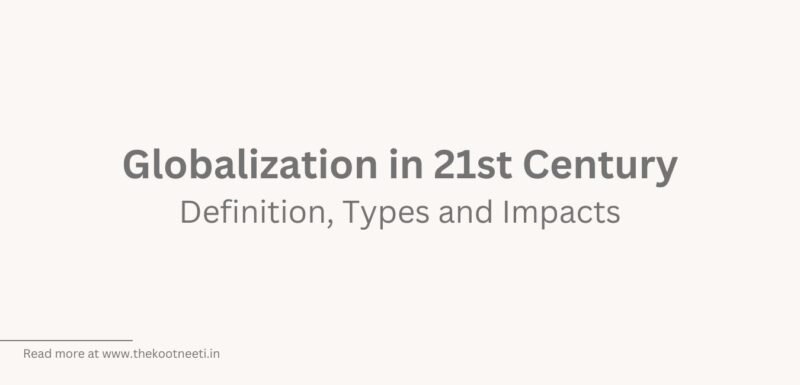Globalization in 21st Century: Definition, Types and Impacts

Globalization refers to the increasing interconnectedness and interdependence of the world’s economies, cultures, and populations. It involves the expansion and intensification of economic, political, social, and cultural exchanges across national boundaries and the growth of a global network of communication and trade.
Globalization has been driven by a number of factors, including advances in transportation, communication, and information technology, as well as liberalized trade and investment policies. It has led to the growth of international trade and investment, the spread of global cultural influences, and the increased mobility of people, goods, and ideas.
Globalization has been a controversial and complex phenomenon, with both positive and negative impacts. On the one hand, it has been credited with driving economic growth, reducing poverty, and promoting cultural exchange. On the other hand, it has also been criticized for contributing to income inequality, cultural homogenization, and environmental degradation.
There are a number of different ways in which globalization can be classified or understood, including:
- Economic globalization: This refers to the increasing integration of the world’s economies through trade, investment, and the movement of capital. It involves the growth of international trade and investment, as well as the integration of financial markets.
- Political globalization: This refers to the increasing interconnectedness of the world’s political systems, including the growth of international organizations and the expansion of international law. It involves the development of global governance mechanisms and the increased influence of international actors on national politics.
- Cultural globalization: This refers to the spread of cultural influences, values, and practices across national boundaries. It involves the exchange of ideas, art, music, and other cultural expressions, as well as the growth of global media and communication networks.
- Social globalization: This refers to the increasing interconnectedness of the world’s societies, including the growth of international migration and the expansion of social networks. It involves the exchange of people, ideas, and practices across national boundaries.
- Environmental globalization: This refers to the increasing interconnectedness of the world’s environmental systems and the impact of global economic and political processes on the environment. It involves the growth of global environmental governance mechanisms and the recognition of the global nature of environmental issues.
Globalization has had both positive and negative impacts on the world’s economies, societies, and cultures. Some of the positive impacts of globalization include:
- Increased economic growth and development: Globalization has contributed to the growth of international trade and investment, which has driven economic growth and development in many countries. It has also led to increased productivity and efficiency, as businesses have been able to take advantage of new markets and technologies.
- Reduction of poverty: Globalization has contributed to the reduction of poverty in many parts of the world. It has allowed developing countries to access new markets and to participate in the global economy, which has led to increased incomes and improved living standards for many people.
- Cultural exchange: Globalization has facilitated the exchange of cultural ideas, values, and practices across national boundaries. It has allowed people to learn about and appreciate different cultures, and has contributed to greater understanding and tolerance among different groups.
However, globalization has also had negative impacts, including:
- Income inequality: Globalization has contributed to income inequality in many parts of the world. It has led to the concentration of wealth in the hands of a few, while many people have been left behind.
- Environmental degradation: Globalization has been linked to environmental degradation, as it has often involved the expansion of extractive industries and the consumption of natural resources. It has also led to the spread of pollution and waste, as well as the negative impacts of climate change.
- Cultural homogenization: Globalization has been criticized for promoting the spread of Western culture and values at the expense of local cultures and traditions. It has led to the erosion of cultural diversity and the loss of traditional ways of life for many people.
- Loss of jobs: Globalization has led to the relocation of many jobs to developing countries, where labor is cheaper. This has led to job losses and declining wages in developed countries, and has contributed to the growth of economic inequality.


















